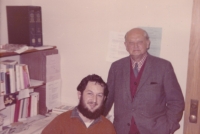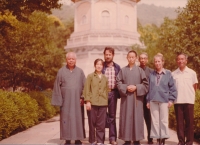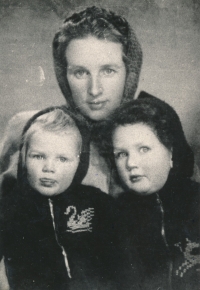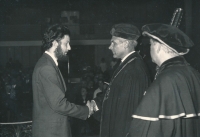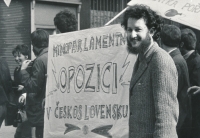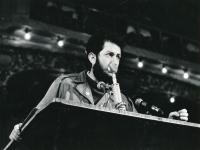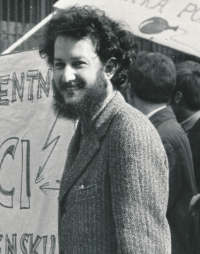To rely on your inner compass

Stáhnout obrázek
Karel Kovanda was born on 5 October 1944 in Gilsland, UK, as the eldest of Oldřich Kovanda and Iva, née Norman‘s, four children. His father was of Jewish descent, and his mother came from a family of farm workers. His parents met while serving in the British Army during World War II and moved to Czechoslovakia in 1946. Both parents were Communists by belief, although the father was briefly imprisoned in 1950 and later persecuted. They only resigned from the Communist Party of Czechoslovakia (KSČ) after the invasion of Warsaw Pact troops in 1968. Karel Kovanda grew up in Říčany, where his family moved in 1953. From childhood, he was interested in foreign languages and foreign policy. After graduating from grammar school (1962), he began his studies at the University of Agriculture, to which he later added a distance learning course in English Studies and History at the Faculty of Arts of Charles University (FFUK). From the mid-1960s, he was an active participant in the student movement, editor of university magazines, and a member of the University District Committee of the Czechoslovak Youth Union (ČSM). He also took part in a Jewish youth group. After the invasion of the Warsaw Pact troops, he led the student strike in November 1968. In the spring of 1969, he was elected chairman of the Union of University Students of Bohemia and Moravia, which was, however, soon banned because they did not join the National Front. In the spring of 1970, he left for the United States, and the initially intended six-week stay eventually became 20 years long. He studied Political Science at the Massachusetts Institute of Technology (MIT) and later earned an MBA. From 1977 to 1979, he worked in China for a foreign broadcast of Chinese Radio to Czechoslovakia, and in the 1980s, he worked in the management of American companies. In August 1990, he returned to Czechoslovakia and from 1991, worked as Head of Administration at the Ministry of Foreign Affairs. From 1993 to 1997, he was the Czech Ambassador to the United Nations, and from 1994 to 1995, he represented the Czech Republic in the UN Security Council. He significantly influenced the UN‘s position on the 1994 genocide in Rwanda, for which he was awarded the Umurinzi Medal - Campaign Against Genocide by Rwandan President Paul Kagame in 2010. As Deputy Foreign Minister between 1997 and 1998, he led negotiations for the Czech Republic‘s accession to NATO, and between 1998 and 2005, he served as the Czech Ambassador to NATO. In April 2005, he was appointed Deputy Director General for External Relations at the European Commission. He is currently (2023) an independent consultant and occasional election observer.
